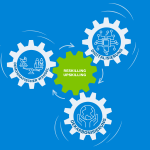How to Establish New Work Holistically
Developing a Successful Work Model
CONTENT
How is the New Work model defined?
Frithjof Bergmann first defined New Work about 20 years ago as “a job that you really, really enjoy doing.” Today, it is understood that New Work is work that:
- strengthens employees,
- gives meaning,
- doesn’t feel like work in the traditional sense,
- makes you feel more alive, and
- also provides an income.
In the podcast with Jan Veira, Gabriel Rath highlighted one important point in the definition of New Work in particular:
New Work is more than just a different way of working
These definitions of New Work sound good, but at the same time they also mean that New Work has not succeeded by changing only the way people work, for example by using MS Teams or home offices.
New Work is only successful if equal attention is paid to mindset, toolset, and skillset. This means:
- The work culture and the attitudes towards work are of great importance. Central questions are: How do we understand each other in the team? Why do we do all this? How do we work well together? What is our common goal?
- It is not enough to just implement tools like MS Teams or Slack for collaboration and online meetings and enable work from the home office.
- New Work needs New Learning: Learning no longer ends after school or university and should not be something you only do when you have to. Instead, the attitude toward learning should be that:
- there is a constant need for new skills in a world where technologies are rapidly evolving,
- personal and corporate development can only be achieved through lifelong learning, and
- new skills and mastering challenges also contribute to personal self-realization and a sense of purpose.
Successfully approaching New Work in the company
From these three areas, the task now is to create a New Work concept that both meets the needs of the employees and promotes the innovative strength of the company. New Work expert Sylvain Newton has described the necessary learning process as follows:
Managers have to design New Work consciously, contextually, and systematically. That means also reflecting on corona time, asking the question in the corporate context 'How can it help us?' What is desired? What can I afford?' and then systematically analyzing which New Work model makes sense for my company.
To this end, the management level should ask itself in workshops with experts:
- How can I manage employees whom I rarely see?
- How can data security be ensured outside the office?
- What opportunities arise for the company through new forms of work and digitalization?
Department heads and team leads face a challenge:
- How do you hold productive meetings with a team that is both in the office and in the home office?
- How do I create a team feeling even with flexible working hours and locations?
Individual employees, on the other hand, need to find ways:
- to ensure that their work is also seen in the home office,
- to keep their private and professional lives separate when working remotely, and to
- learn how to use new tools.
These challenges cannot be overcome by a single workshop. University4Industry, together with Sylvain Newton, has developed skill-building learning paths for team leads and team members to implement new ways of working in a sustainable way.
Find out more about our
New Work Training here.




